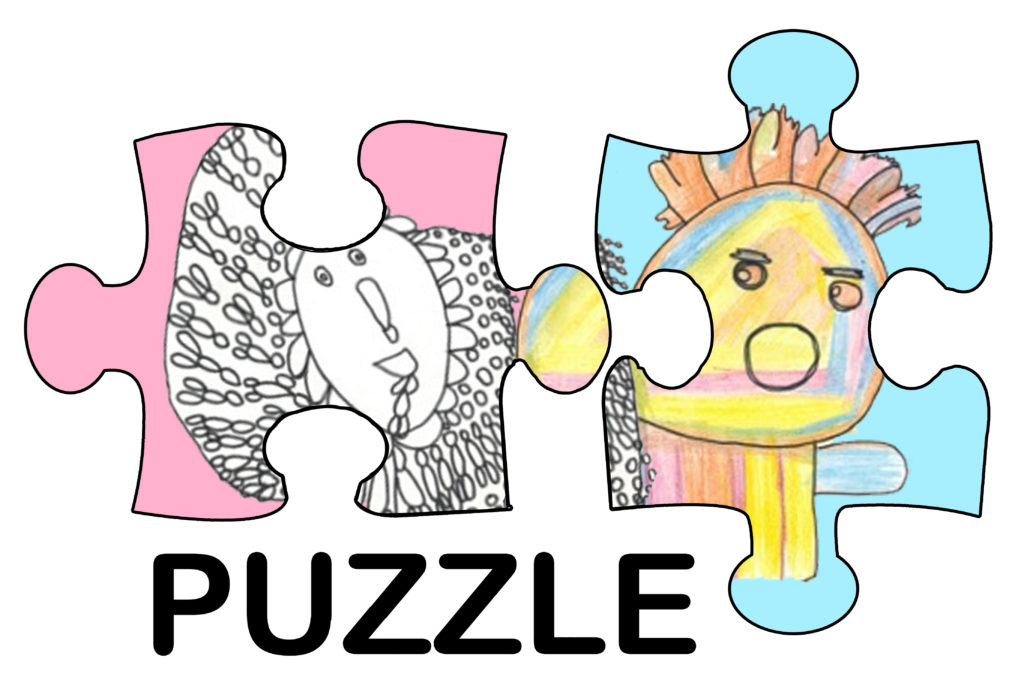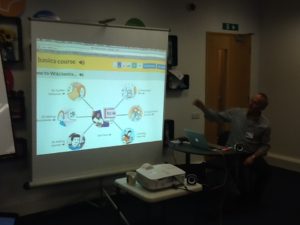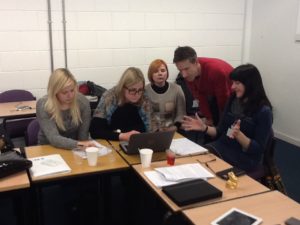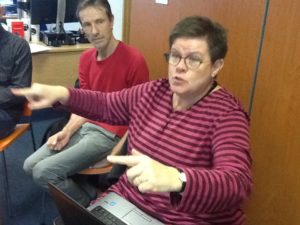
Rix Research is working with the Foundation for Research and Technology Hellas (FORTH) in Greece on a new, two-year project funded by Erasmus+ KA2: Co-operation for Innovation and the Exchange of Good Practices. The project, called Puzzle, is a Strategic Partnership for adult education and also involves agencies from Sweden, Poland and Lithuania.
 Currently, adults with intellectual disabilities (ID) in these European countries have fewer opportunities for education and training or for participating in the social and economic spheres of life. This is partly because much of the existing educational text has not been adapted to the specific needs and language skills of adults with ID, so that it can be easily understood. There is also a low take-up of suitable digital tools to support learning with adapted materials, both because the educators are not aware of the availability of such tools nor do they have the knowledge and skills to use them effectively.
Currently, adults with intellectual disabilities (ID) in these European countries have fewer opportunities for education and training or for participating in the social and economic spheres of life. This is partly because much of the existing educational text has not been adapted to the specific needs and language skills of adults with ID, so that it can be easily understood. There is also a low take-up of suitable digital tools to support learning with adapted materials, both because the educators are not aware of the availability of such tools nor do they have the knowledge and skills to use them effectively.
The Puzzle project brings together the particular knowledge and experience of each partner agency to address this issue. The Swedish agency, MTM, is expert on the use of the ‘easy to read’ method, which facilitates the transformation of text into forms that are easily understood by people with limited capabilities in reading. Their expertise is being combined with that of Rix Research, which is a pioneer in the inclusive development of accessible digital media tools to support people with ID. Greek agency FORTH, which has extensive experience in the development of related applications, will contribute further to the work.
 Puzzle is now well underway. An international team of 12 education professionals from Greece, Poland and Lithuania is being trained by the MTM specialists on the ‘easy to read’ method and by the Rix Research specialists on using innovative technology platforms as the main way of disseminating ‘easy to read’ material. Everyone came together in February, for a week’s concentrated workshop held in London, at the Rix offices at the University of East London’s Docklands campus. The workshop was a great success as the participants explored how the quality and accessibility of information provided to people with ID can be improved.
Puzzle is now well underway. An international team of 12 education professionals from Greece, Poland and Lithuania is being trained by the MTM specialists on the ‘easy to read’ method and by the Rix Research specialists on using innovative technology platforms as the main way of disseminating ‘easy to read’ material. Everyone came together in February, for a week’s concentrated workshop held in London, at the Rix offices at the University of East London’s Docklands campus. The workshop was a great success as the participants explored how the quality and accessibility of information provided to people with ID can be improved.
Richard Lohan, accessible information officer at Camden Council, was a guest tutor at the workshop. He presented on the exciting work he is doing in Camden to promote the use of photosymbols in easy read information. Richard uses photosymbols in Camden’s exemplary wiki portal, which details many of the information and support services available to people with ID in the borough (https://www.rixwiki.org/camden/all-our-wikis/ ). Camden has also found a way of embedding their wikis in their local offer website in order to reduce the number of external links on the page.
Richard said: “Creating and using images is a key part of presenting information in an accessible, easy read format. In Camden, we are working with local people with intellectual disabilities to create local photosymbols that have real meaning for those living in the area. It’s a great example of co-production.”
 The Puzzle project will also see further research, led by Poland, on assessing how adults with ID in Greece, Poland and Lithuania access information on their human rights and their difficulties in understanding the written information. The research will lead to the development of an e-learning platform and mobile application, with information and learning materials on human rights issues produced in ‘easy to read’ format. This will then enable the design and testing of a series of ‘easy to read’ lesson plans to help people with ID understand their basic rights, for example in employment, housing, social integration and education
The Puzzle project will also see further research, led by Poland, on assessing how adults with ID in Greece, Poland and Lithuania access information on their human rights and their difficulties in understanding the written information. The research will lead to the development of an e-learning platform and mobile application, with information and learning materials on human rights issues produced in ‘easy to read’ format. This will then enable the design and testing of a series of ‘easy to read’ lesson plans to help people with ID understand their basic rights, for example in employment, housing, social integration and education
The active participation of people with ID in the research to create the ‘easy to read’ text and accessible web platforms is critical. By working directly with the ID community on the design and production of the information, the researchers will achieve the best possible output and ensure that people with ID can communicate effectively about themselves and their rights. The expertise that Rix Research has developed in Inclusive Research Methodologies will also help the research team to gain confidence in taking a co-production approach and exploring how to develop this further.
The implementation of Puzzle will motivate and encourage professionals and organisations in the field to develop their skills and widen considerably the learning opportunities of people with difficulties in reading comprehension. Important information and educational course materials available in ‘easy to read’ formats, on accessible digital applications, will be free for use by any person with ID and difficulties in reading comprehension in each of the countries.
Another training workshop for Puzzle is set to take place in November, hosted by the Lithuanian agency, Jaunuoliu Dienos Centras, in Panevezys. Rix Research will present the digital platform and app that it is currently developing, as part of the resource set of accessible media tools that will be made available across Europe.
Andy Minnion MBE, Professor of Media Advocacy at Rix Research & Media, said:
“There is so much excellent work being done around the world to drive positive change in the lives of people with ID and their families. Enabling people with ID to learn about, and understand, their human rights is fundamental to their ability to move towards ever greater levels of self-advocacy, self-determination and independence. I’m incredibly proud of the work that we are doing at Rix at the forefront of this change.”
Project number: 2015-1-EL01-KA204-014123
Useful websites:

